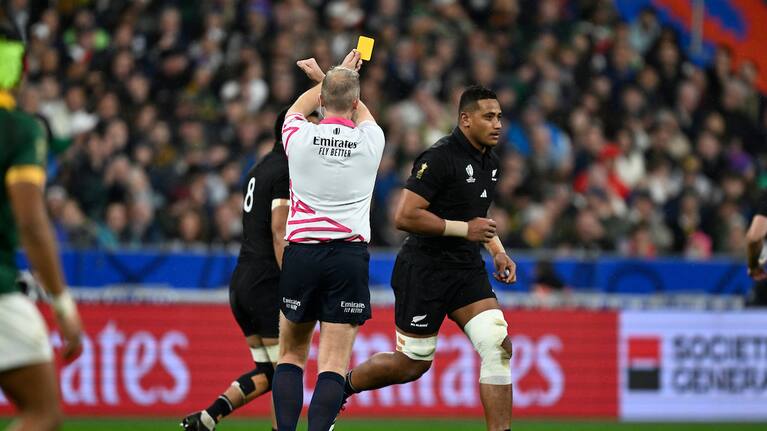Analysis: The officiating of the match, in particular the number of interjections from the TMO, will naturally be a topic for debate, but first the plaudits must flow for the Springboks, writes Scotty Stevenson.
Where are the fairy tales when you need them? For the All Blacks the Rugby World Cup final began with fresh hope and ended in familiar heartache.
In between, a wet, bloody and chaotic display dominated by two men: Pieter-Steph du Toit, and Tom Foley. One of them played the game of his life. The other had the biggest say.
It rained on the players, and on the fans. It rained on Ian Foster’s parade.
Four cards were issued in this tense and torrid affair, all at the behest of Foley, who combed through the footage with dogmatic and forensic intent. Shannon Frizell went first, essentially for falling over.

Sam Cane went next, his World Cup final finished on half an hour after a shoulder to the head of Jesse Kriel. The card was upgraded to red, and a disconsolate Cane sat motionless and emotionless on a sideline chair.
Siya Kolisi followed in the second half, for making a head-on-head tackle on Ardie Savea but his card remained yellow, a decision that will be debated for many days and weeks to come.
Cheslin Kolbe finished the last seven minutes of the match in the bin, his head buried in his jersey, praying for full time. When it came, the Springboks were world champions again. By a single point.
The All Blacks had their chances in the downpour, including a 74th minute Jordie Barrett penalty kick that sailed past the left hand upright.
There will be plenty of fans inclined to claim injustice, but – and this is what will haunt this team most - the effort and the courage the New Zealanders showed to stay in the fight was simply not matched with the necessary accuracy and patience required to get around and through this brutal South African side.
The Springboks were masterful where it mattered. They niggled, and they hit, and they flopped, and they scrambled.
Du Toit was a colossus, making tackle after tackle. He seemed to be everywhere all at once. Rarely did he miss.
Deon Fourie, who replaced Mbongeni Mbonambi in the opening minutes, was tenacious over the ball.
Kwagga Smith closed out the match with three crucial turnovers.
Eben Etzebeth was at his mischievous and menacing best. South Africa’s ability to control tempo, alloyed to a defence that held firm when it mattered, ultimately won them the world title.

In the end, the Springboks won by a point. Just as they had last week, and the week before that. They were the better side – better when they needed to be.
The Springboks backline operated with more fluency than New Zealand’s, which would not have been anyone’s guess before the match began.
Pass after pass was collected behind an All Black hip. Carry after carry was halted before the gain line.
The All Blacks absorbed pressure and created chaos of their own, but the final pass inevitably went forward, the final kick long, the final bounce seemed to elude every grasping All Black hand.
A moment of Richie Mo’unga magic in the 54th minute created a try for Aaron Smith but was rubbed from the record book when replays showed an Ardie Savea knock on.
If the game could be distilled into a simple sentence: Not much went right for New Zealand.
That did not stop them trying. Jordie Barrett and Savea were immense, constantly throwing themselves at the defensive line.
Barrett’s post-match tears told a tale of their own. Bitter tears in cold October rain. Cane called the team a "bunch of warriors" and he was right in that assessment. They played for him, they played without him.
The officiating of the match, in particular the number of interjections from the TMO, will naturally be a topic for debate, but first the plaudits must flow for the Springboks.
For three straight weeks they have had to dig ever deeper into their reserves of energy and resolve.
For three straight weeks they have managed to hold on by a point. There can be no denying that they are the greatest tournament team in World Cup history. They would, and tonight did, bleed for their team and for their nation.
The Foster era ends in defeat in the Parisienne wet. His legacy a complicated one.
Smith and Sam Whitelock, 276 tests between them, finish their careers on a bum note. They don’t deserve that, but sport at this level promises nothing and takes so much in return.
Cane will have to live with a fraction of a second forever. Who deserves that? At the end this was another brutal Test between two incredible teams. And only one of them was crowned world champion.
Where are the fairy tales when you need them? On this occasion they are written in the rainbow nation.
























SHARE ME